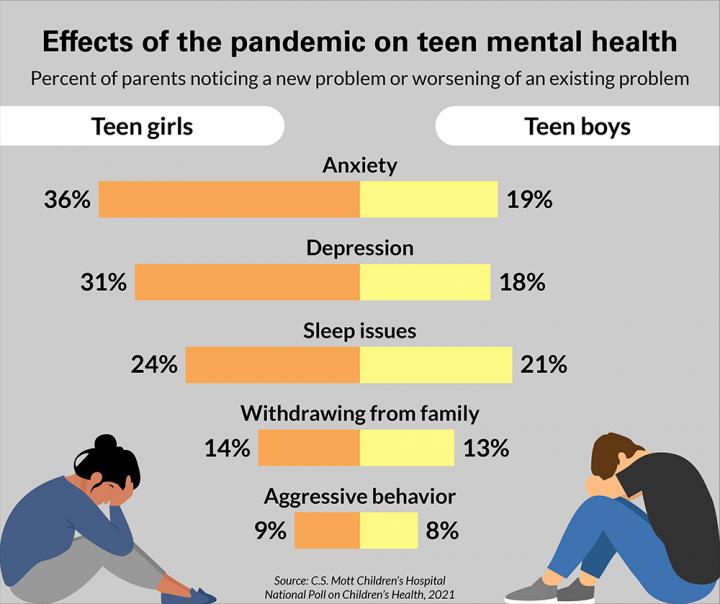And if a new national poll is an indication, government lockdowns and societal pressure during the COVID-19 pandemic may have lasting impacts on the mental health of young people.
The C.S. Mott Children's Hospital National Poll on Children's Health at Michigan Medicine is based on responses from 977 parents of teens ages 13-18 and finds that 46% of parents say their teen has shown signs of a new or worsening mental health condition since the start of the lockdowns in March of 2020. Parents of teen girls were more likely to say their child had a new onset or worsening of depressive symptoms and anxiety than parents of teen boys.
One in three teen girls and one in five teen boys have experienced new or worsening anxiety, the poll suggests. More parents of teen girls than parents of teen boys note an increase in anxiety/worry (36% vs. 19%) or depression/sadness (31% vs. 18%). Similar proportions of parents report negative changes in their teen's sleep (24% for girls vs. 21% for boys), withdrawing from family (14% vs. 13%) and aggressive behavior (8% vs. 9%).

Credit: C.S. Mott Children's Hospital National Poll on Children's Health at Michigan Medicine
Parents in the poll say their kids seem hardest hit by changes in social interactions over the last year, with three in four reporting a negative impact on their teen's connections to friends.
Many parents say their teens have been texting (64%), using social media (56%), online gaming (43%), and talking on the phone (35%) every day or almost every day. Few parents say their teens have been getting together in person with friends daily or almost every day, indoors (9%) or outdoors (6%).
Parents who note negative changes in their teens' mental health have tried different strategies to help their teen, the Mott Poll suggests, including relaxing COVID-19 rules and family rules on social media, seeking professional help and even using mental health apps.
One in seven parents in the poll reported their teen has withdrawn from family since the start of the pandemic. Parents may try to show teens they're not alone by sharing some of their own worries and successful strategies that help them cope while asking questions that create a safe space for candid conversations.
At the same time, Freed notes, it's also normal for teens to crave privacy from their family. Giving them space for some quiet time, creative time or music time can be helpful to their mental health.
Child health experts emphasize the importance of sleep for teens, especially when they are under stress. Almost one in four parents in the Mott Poll say their teens were experiencing negative changes in their sleep since the pandemic started.





Comments